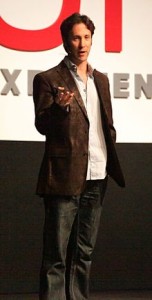[contextly_auto_sidebar id=”Ik2UBDsLb9qxlWm7jqiO4d9Utt1cqk1Y”]
SO who decides what we do — our biology or us? Is there anyone home, or do we just run through our decisions the way nature programmed us? I didn’t think there was a lot more to say about free will, which often provokes dull, abstract debates, but a presentation in Puebla, Mexico last week by David Eagleman, a neuroscientist at Baylor College, fascinated me.
Eagleman’s speech — and I saw a lot of good ones last week at La Ciudad de las Ideas, an ideas conference — had real consequences for our society and our criminal justice system specifically.
 He started by mentioning that our brains are made up of roughly 100 billion neurons, each as complicated as the city of Puebla, and each one wired to thousands of others. But there’s a stranger inside our brain: “Deeply carved evolutionary programs run in the background.”
He started by mentioning that our brains are made up of roughly 100 billion neurons, each as complicated as the city of Puebla, and each one wired to thousands of others. But there’s a stranger inside our brain: “Deeply carved evolutionary programs run in the background.”
So many of our decisions are unconscious, he says — we’re more likely, for instance, to marry someone whose name shares a first name with ours (guilty as charged). A lot of violent criminals, he says, had brain tumors and things like that, including Charles Whitman, who went on a shooting spree from a tower at the University of Texas in 1966.
To what extent, Eagleman asked, “does the mental equal the physical”? Is biology destiny? How does morality and decision making look different when we digest all of this?
Meanwhile, in the U.S., we have a one-size-fits all criminal justice system — we lead the world in incarceration, and 30 percent of those behind bars have some kind of mental illness.
I’m skeptical of reductive neuroscience explanations — I think the human soul and human relationships, and especially our culture are more complex than some scientists acknowledge. But Eagleman was persuasive.
Eagleman, who’s written several books and founded the Initiative on Neuroscience and the Law at Baylor. Dude is worth watching.

“….brain tumors and things like that, including Charles Whitman…”
Except the coroner said it likely had little to do with his violent act. The tumor was in a part of the brain that controlled basic motor function, not higher rational thinking. If it had become malign Whitman would have had trouble walking and talking.
You can cut to the chase on this and simply ask a person, “who is your God?” Who or what is the final authority in your philosophy of life? If it is materialistic determinism then you should not believe in free will since it can’t exist in your worldview. The most interesting discussion on this (also short and to the point) is in the book “Three Theories of Everything” by Ellis Potter. He was a Zen Buddhist master for 15 years or so and finally left that and became a Christian because of the reasons described in the book. He makes an interesting statement that describes God in way I had never heard before, even though I have read a lot of Christian theological books. He tells us that “God is not automatic”. And since we are made in God’s image we are not automatic either. He then goes on and discusses the problem of suffering and evil. Quite powerful.